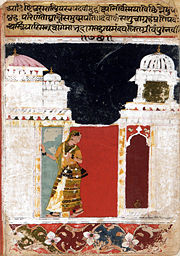
Amaru Shataka
Encyclopedia

The Amaruśataka ranks as one of the finest lyrical poetry in the annals of Sanskrit literature
Sanskrit literature
Literature in Sanskrit begins with the Vedas, and continues with the Sanskrit Epics of Iron Age India; the golden age of Classical Sanskrit literature dates to late Antiquity . Literary production saw a late bloom in the 11th century before declining after 1100 AD...
, ranking with Kalidasa
Kalidasa
Kālidāsa was a renowned Classical Sanskrit writer, widely regarded as the greatest poet and dramatist in the Sanskrit language...
and 's . The ninth-century literary critic Anandavardhana
Anandavardhana
Anandavardhana was the author of Dhvanyaloka, a work articulating the philosophy of "aesthetic suggestion". The philosopher Abhinavagupta wrote an important commentary on it.Anandavardhana is credited with creating the dhvani theory...
declared in his Dhvanyaloka that "a single stanza of the poet Amaru ... may provide the taste of love equal to what's found in whole volumes." Its verses have been used by poets and critics as examples and standards to judge other poems by. Andrew Schelling
Andrew Schelling
Andrew Schelling Andrew Schelling Andrew Schelling (born January 14, 1953 Washington D.C. is an American poet and translator.-Life:He grew up in New England. He moved west to Northern California in 1973. There he explored wilderness regions of the Coast Range and Sierra Nevadas. He studied at...
describes it as "love poetry original and vivid as that produced anywhere on the planet".
Its subject is mostly Sringara
Sringara
Sringara is one of the nine rasas, usually translated as erotic love, romantic love, or as attraction or beauty. Rasa means "flavour", and the theory of rasa is the primary concept behind classical Indian arts including theatre, music, dance, poetry, and even sculpture. Much of the content of...
(erotic love, romantic love) including aspects such as love, passion, estrangement, longing, rapprochement, joy and sorrow, etc. Greg Bailey notes that it is "as much about the social aspects of courting, betrayal, feminine indignance and masculine self-pity as it is about sensuality". Similarly, Schelling notes: "All the flavours or nuances of love are said to lie within the book, though you'll notice that the emphasis falls more on the bitter taste of separation or betrayal than on the sweetness of consummation."
Authorship
Not much is known about the life of Amaru. Traditional accounts attribute the work to King Amaru of Kashmir. The collection in its present form may well represent the work of more than one author—the poems that form part of the collection differ quite significantly across its different regional recensions.There are also a number of legends associating the collection with the philosopher Adi Shankara
Adi Shankara
Adi Shankara Adi Shankara Adi Shankara (IAST: pronounced , (Sanskrit: , ) (788 CE - 820 CE), also known as ' and ' was an Indian philosopher from Kalady of present day Kerala who consolidated the doctrine of advaita vedānta...
. One version occurs in his 14th century biography written by a follower, the Shankara-digvijaya. According to this version, during his debate with Maṇḍana Miśra
Maṇḍana Miśra
was a Hindu philosopher, who wrote on the Mīmāmsā and Advaita systems of thought, and was a student and follower of Ādi Śankara. Maṇḍana Miśra, also known as Suresvaracharya, was a follower of the Karma Mimamsa school of philosophy and a staunch defender of the holistic sphota doctrine of language...
, he was asked philosophical questions phrased in metaphors of love by the latter's wife, Ubhaya Bharati. Being celibate and therefore ignorant of the kama shastras, Shankara requested an adjournment. He then entered the recently-dead body of Amaru and spent a hundred days mastering the art of erotic love, before returning to defeat his opponent. He wrote the Amarushataka to memorialise his learning.
Another version, given in Ravichandra's commentary on the Amarushataka, states that Shankara composed these poems to impart spiritual insight to the epicurean king Amaru, in metaphors he might understand. When this was misunderstood and mocked by the advisers at the court, Shnakara entered the body of Amaru and provided a spiritual exegesis of the poems.
Accordingly, several manuscripts add colophon
Colophon
Colophon was a city in the region of Lydia in antiquity dating from about the turn of the first millennium-BC. It was likely one the oldest of the twelve Ionian League cities, between Lebedos and Ephesus and its ruins are in the eponymously named modern region of Ionia.The city's name comes from...
s naming Shankara as the true author of the work, and Ravichandra, a mediaeval commentator on the Bengal recension of the Amarusataka, read metaphysical meanings into the verses. Other legends also state that Amaru was the 101st reincarnation of a soul that had previously occupied 100 women.
English translations
- Erotic Love Poems from India, A Translation of the Amarushataka translated by Andrew Schelling, Shambala Library, 2004.
- The Amaruśataka was also translated by Greg Bailey as part of the volume Love Lyrics in the Clay Sanskrit LibraryClay Sanskrit LibraryThe Clay Sanskrit Library is a series of books published by New York University Press and the JJC Foundation. Each work features the text in its original language on the left-hand page, with its English translation on the right...
.
Sources
- Arthur Anthony MacdonellArthur Anthony MacdonellArthur Anthony Macdonell , 7th of Lochgarry, was a noted Sanskrit scholar.Macdonell was born in India and educated at Göttingen University, then matriculated in 1876 at Corpus Christi College, Oxford, gaining a classical exhibition and three scholarships...
(1900), A History of Sanskrit Literature, Chapter 12
External links
- Amaru – The Lyric Poet, by Aparna Chatterjee
- Some verses from Schelling's translation
- The Sanskrit text at GRETILGRETILThe Göttingen Register of Electronic Texts in Indian Languages is a comprehensive repository of e-texts in Sanskrit and other Indian languages.It contains several texts related to Indology, such as philosophical texts...

